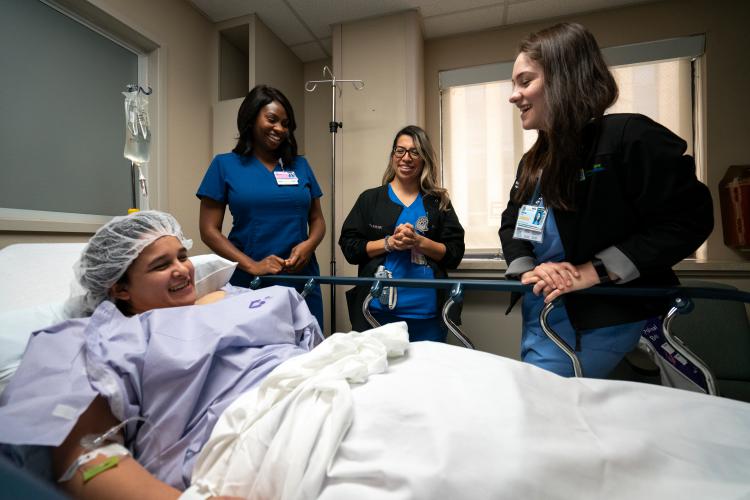
Growing up in Mexico, JPS Health Network RN Tania Ayala saw her family members suffer unnecessarily because they didn’t have quality healthcare options available to them.
She was inspired when she moved to Fort Worth at 13 years old and saw the care members of her family were suddenly able to receive, ranging from routine check-ups to women’s healthcare and diabetes treatment. Ayala decided she wanted to help make a difference in her adopted community, so she went to nursing school.
“Being part of a low-income household with four children, JPS was the go-to place for medical care for us,” said Ayala who volunteered at JPS as a teen before coming to work there full time as an adult. “This is the only place I wanted to work, it’s my first job out of nursing school and I love working here. I tell people that I plan to retire from JPS.”
Things like witnessing an uncle suffering from cancer have to move in with her family so her parents could take care of him and seeing female relatives who didn’t have access to basic women’s health care and testing inspired Ayala to do something to make those services more-readily available to low-income families. She works on 2 South Women’s floor at JPS, a place where new and expectant mothers receive care for complicated pregnancies. There, more than half of the patients speak Spanish. Tania became certified as a translator so she could use her native language to help them communicate with doctors and to feel as if they have someone they can talk to about their problems.
Jeri Ames, RN Clinical Manager of 2 South Women’s, said Ayala is constantly taking initiative to expand her skills to find new ways to help people. The way she makes the extra effort has paid off time and again.
“She has many patients she has connected with over time at JPS,” Ames said. “One instance stands out in my mind where the patient had lost her baby before she came to the hospital.”
Because Tania is a certified Spanish interpreter, she was able to sit and talk with the patient to comfort her.
“Given her connection with the patient and family, she stayed over to be that person who made sure all of their questions were answered,” Ames said, explaining that Ayala is always willing to do whatever it takes to help a patient in her time of need.
While working on 2 South can be an emotional rollercoaster, with the highs of guiding mothers to success following a complicated pregnancy to the low of seeing your women taking new babies fighting terminal illnesses, Ayala wouldn’t want to be anywhere else. She says it’s her duty to make a difference for the better in people’s lives.
Ayala has received both a Golden Stethoscope and a Daisy Award, two prestigious honors for nurses in recognition of her work. But one of her proudest accomplishments heading up a JPS cancer awareness campaign.
“Cancer is a really important issue for women, especially for younger women and minorities,” Ayala said. “Especially cancer of the reproductive system and other cancers unique to women. It’s so easy to say you don’t have time to go to the doctor because you have kids. But, if something happens to you, who will take care of your kids?”
Ames said Ayala’s passion for prevention and early recognition of gynecologic cancers is inspiring to her team members.
“(Ayala) leads a team of 2 South team members and others who participate in back to school events, health fairs, and other similar places where Hispanic patients gather to share the importance of well woman checks and screenings for gynecologic cancer,” Ames said. “She, by personal experience, finds that many patients who are of her culture do not seek out care and this places them at higher risk. I think this hit her heart when we were seeing advanced stage cervical cancer in patients as young as 22 years old, many who did not live due to the advanced stage of their cancer at the time of diagnosis.”
In addition to her work at JPS, Ayala would also like to do some mission work in the future, setting up women’s care clinics in other countries including her native Mexico. But she can’t imagine a time when she would leave JPS.
“I’ve seen so many nurses go someplace else to work only to come back a short time later,” Ayala said. “It’s because JPS is a special place where there are so many opportunities to grow and to learn new ways to help people. That’s why this is a special place for me.”
